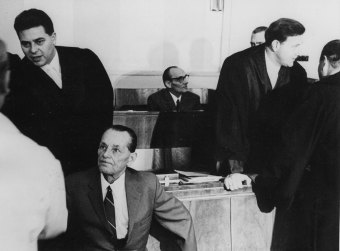The Third Frankfurt Auschwitz Trial (1966–1967)

© Fritz Bauer Institute
It was not only the SS camp personnel from the Auschwitz-Birkenau concentration and extermination camp and the Buna/Monowitz concentration camp who were called to account in Auschwitz trials, prisoners who had acted as henchmen of the SS and committed crimes against their fellow inmates were held liable as well.
In the concentration camps, the SS transferred to a few chosen prisoners certain functions which they had to perform, in the administrative interest of the SS, for the purpose of running an ostensible prisoner self-administration system under constraint and by command. These so-called prisoner functionaries often proved to be compliant tools of the SS. Misusing the power over the camp inmates that was conferred on them by the SS, they bullied and hit their comrades. They also committed murder, either following an order of the SS or acting on their own initiative.
From the camp elder to the camp Kapo and the Oberkapo, from the block elder to the room elder and the room orderly (Stubendienst), from the inmate doctor to the inmate orderly and the nurse’s aide: Every prisoner to whom the SS transferred a function could set himself up as master of life and death, to the extent allowed by the SS.
Former block elder Emil Bednarek already had been brought before the court in the first Frankfurt Auschwitz Trial. The court sentenced him to life imprisonment on 14 counts of murder. In the third Frankfurt Auschwitz Trial, too, two prisoner functionaries were called to account. The former camp Kapo of Auschwitz I and camp elder of the Buna/Monowitz concentration camp, Josef Windeck, and the former block elder and Oberkapo of Auschwitz I, Bernhard Bonitz, were found guilty of murder and sentenced to life in prison. Among other crimes, Windeck was shown to have beaten to death an enfeebled prisoner in the Buna/Monowitz camp who had to carry a food vat, and to have drowned another camp inmate in a water barrel.
As in National Socialist trials in general, homicides not committed in obedience to a command were deemed to be murder if they resulted from base motivations or were perpetrated with cruelty. In the view of the judges, offenders who acted on their own initiative or as “excess perpetrators” (Exzesstäter; sadists or morally unprincipled persons), whether they were SS men or prisoner functionaries, bore sole responsibility for their conduct. Their individual culpability resulted from acting on their independent initiative.
In the public, there was an impression that so-called Befehlstäter (perpetrators who were following orders)—often higher-ranking SS enlisted men—who, in the opinion of the courts, had only obeyed an order and lacked the requisite criminal intent, and hence were deemed accessories, got off with unjustifiably light sentences. The criminal justice system, according to the critical perception of the National Socialist proceedings, let the big fish—allegedly mere recipients of orders, just doing what they were told—more or less go free, while it held the little ones strictly to account: the garden-variety offenders acting on their own initiative and the Exzesstäter, who had made the bloodlust of the criminal state leadership their own.
(WR; transl. KL)
















